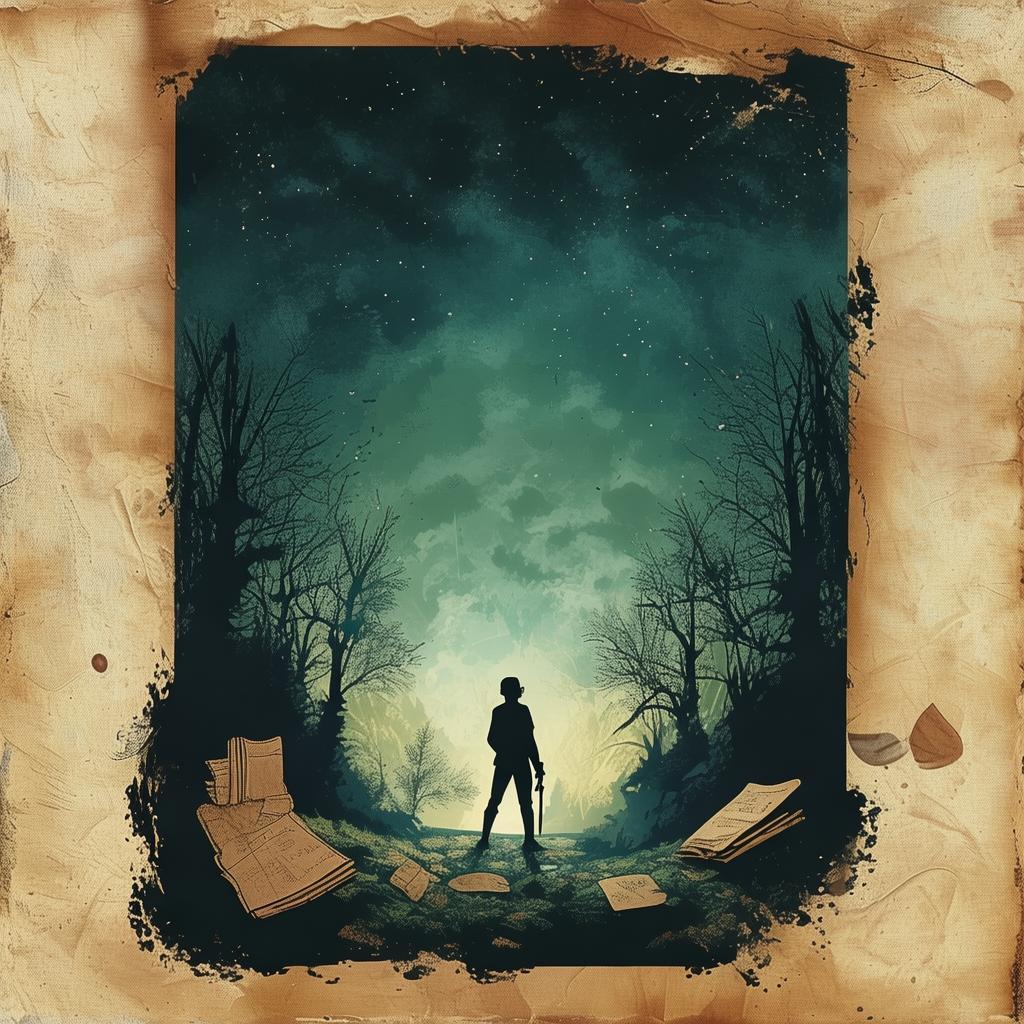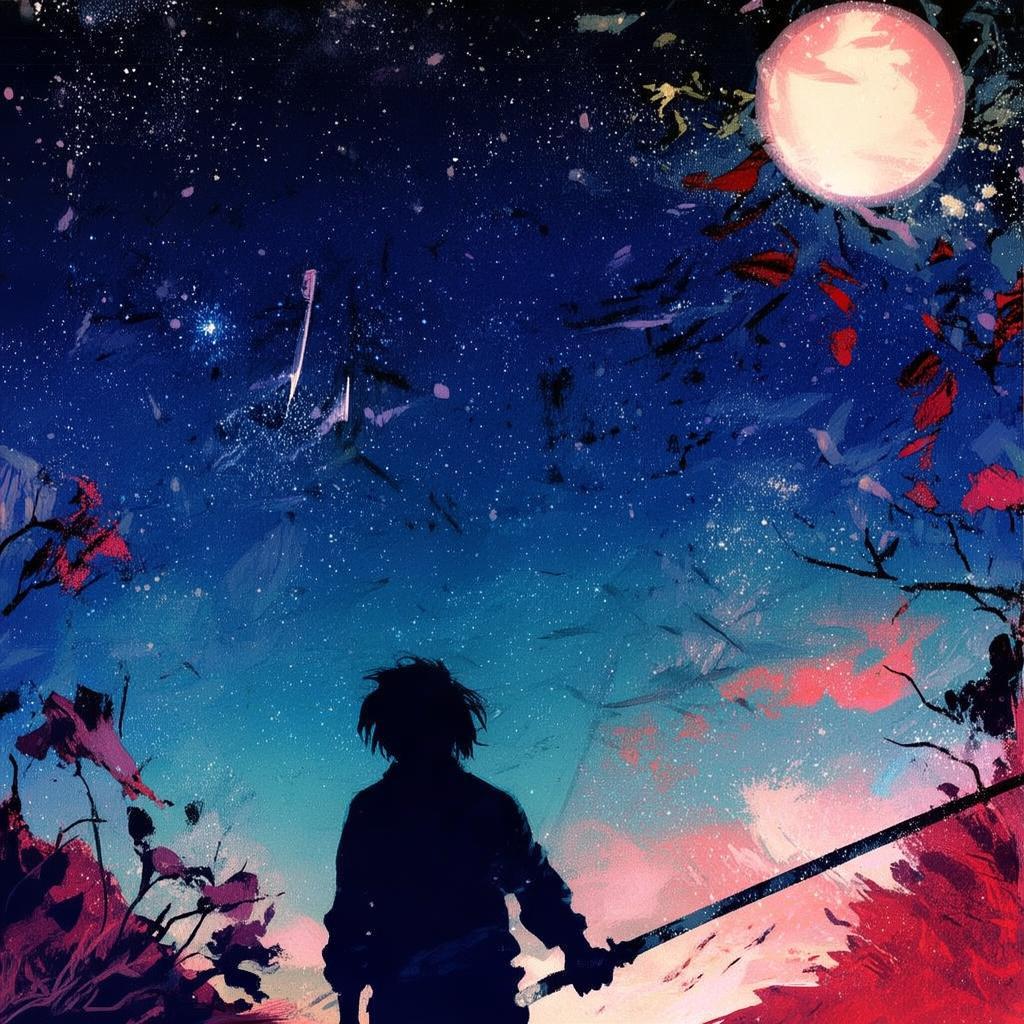The Last Fiddler's Requiem
The sun dipped below the horizon, casting a golden glow over the vast prairie. In the heart of this desolate landscape, a small, makeshift campsite buzzed with the activity of a community on the move. The air was thick with the scent of smoke from a dwindling fire, and the sound of a fiddle filled the silence, weaving a melody that seemed to dance with the shadows.
Eli, a young man with a face etched with the lines of hardship, sat by the fire, his fingers deftly dancing over the strings of his fiddle. His eyes were focused, lost in the music that seemed to carry the weight of a thousand stories. The campsite was his home, a temporary shelter for a group of Jewish pioneers who had fled their ancestral lands in search of a new beginning.
Eli's life had been one of constant movement. As a child, he had witnessed the destruction of his village, the brutal expulsion of his people. Now, as an adult, he was part of a new wave of pioneers, seeking refuge in the promise of the American prairie. But the promise was a fragile one, and the shadows of the past were never far behind.

The fiddle was his lifeline, a connection to the world he had left behind and a source of comfort in the harsh realities of their new life. It was also a symbol of his people's resilience, a testament to the strength that had carried them through the darkest of times.
One evening, as the campsite settled into a quiet repose, a figure approached Eli. It was Mordechai, the leader of the pioneers, a man of stern resolve and a heart as big as the prairie itself. Mordechai's eyes held a weight that Eli could not ignore.
"Eliezer," Mordechai began, his voice low and urgent, "there is trouble. The settlers are growing restless. They are planning to attack us."
Eli's heart sank. The settlers had been patient, but the longer they remained, the more their patience wore thin. The pioneers had little to offer but their presence, and it was a presence that was becoming increasingly unwelcome.
"We must leave," Mordechai continued. "We have to find a new place to settle, a place where we can live in peace."
Eli nodded, his fiddle lying unused in his lap. "We will leave," he said, though the thought of packing up their belongings and moving once again filled him with a heavy sense of dread.
That night, as the pioneers prepared to set out, a sense of unease hung in the air. The campsite was a sea of tents and lanterns, each person lost in their own thoughts, the weight of the world pressing down upon them.
Eli and Mordechai stood apart, their conversation a whisper against the night. "You must go with us," Mordechai said. "Your skills are needed. You are the last fiddler."
Eli's eyes widened. "The last fiddler?" he repeated, the words echoing in his mind.
"Yes," Mordechai confirmed. "The settlers have heard of you. They believe that your music is cursed. They want to kill you."
Eli's hands tightened around the neck of his fiddle. "Why me?"
Mordechai sighed. "Because you are a symbol of our people's resilience. They see you as a threat."
Eli knew the truth of Mordechai's words. He was the last fiddler, the keeper of a tradition that had been passed down through generations. And now, that tradition was in danger.
The next morning, as the pioneers prepared to leave, Eli felt a strange sense of calm. He knew that he had to survive, not just for himself, but for his people. As he stepped into the prairie, the vast, open landscape stretched out before him, a canvas for his survival.
Days turned into weeks, and Eli's journey was fraught with peril. He encountered settlers who wanted nothing more than to see him dead, and he outsmarted them time and again. His fiddle became his weapon, his voice a siren call that drew the enemy closer, only to have him slip away in the night.
One evening, as the sun dipped below the horizon, Eli found himself in a clearing, his fiddle case clutched tightly in his hands. He had been on the run for weeks, and the weight of his burden was becoming too much to bear.
Sitting by a small fire, Eli's eyes met the flames. He knew that he could not continue much longer. The settlers were closing in, and he was running out of options.
"I can't go on," he whispered to the fire. "I can't protect everyone."
As he spoke, a figure approached him from the shadows. It was a settler, his eyes gleaming with malice.
"You won't escape me, fiddler," the settler hissed. "You are mine."
Eli's heart raced. He reached for his fiddle, but it was too late. The settler lunged at him, his hand closing around Eli's neck.
In a desperate bid for survival, Eli struck out with his elbow, knocking the settler off balance. The two men grappled, their movements a blur of motion and force. Eli's fingers found the strings of his fiddle, and he played a single, haunting note.
The note resonated through the clearing, and the settler's eyes widened in shock. He stumbled back, his grip loosening on Eli's neck. In that moment, Eli's life hung in the balance.
The settlers emerged from the shadows, their faces twisted with rage. Eli knew that he had to make a choice. He could fight them, or he could run.
He chose to run.
The settlers chased him across the prairie, their voices growing louder with each step. Eli's legs pumped, his breath coming in ragged gasps. He could feel the weight of the settlers closing in, the sound of their footsteps a relentless drumbeat.
As he reached the edge of the clearing, Eli stumbled. His legs gave out, and he fell to the ground. The settlers were almost upon him. There was no time for hesitation.
Eli reached for his fiddle, his fingers skimming the strings. He played one last note, a high-pitched sound that seemed to pierce the very fabric of the world.
The settlers halted, their eyes wide with fear. Eli pushed himself to his feet, his heart pounding in his chest. He turned and ran, the sound of the settlers' pursuit fading into the distance.
Eli continued to run, his legs pumping, his breath coming in gasps. He had escaped, but he knew that the settlers would not give up. He had to find a place to hide, a place where he could rest and plan his next move.
As he ran, Eli thought of his people, of the pioneers who had left their homes behind in search of a new beginning. He thought of Mordechai, who had entrusted him with the responsibility of being the last fiddler.
Eli had failed them, but he would not give up. He would find a way to protect his people, to keep their legacy alive.
As the sun rose the next morning, Eli found himself in a small, secluded valley. The settlers had not followed him, and he was safe for now. He sat by a small stream, his fiddle case open in front of him.
Eli took a deep breath, and his fingers began to dance over the strings of his fiddle. The music flowed from him, a testament to the resilience of his people, a reminder that even in the darkest of times, hope could be found.
The music filled the valley, a beacon of light in the shadowed world. Eli played until the sun set, his fingers weary but his heart full of determination.
He would survive, and with his music, he would keep his people's legacy alive.
And so, the last fiddler's requiem played on, a melody that would echo through the ages, a testament to the indomitable spirit of a people who would not be silenced.
✨ Original Statement ✨
All articles published on this website (including but not limited to text, images, videos, and other content) are original or authorized for reposting and are protected by relevant laws. Without the explicit written permission of this website, no individual or organization may copy, modify, repost, or use the content for commercial purposes.
If you need to quote or cooperate, please contact this site for authorization. We reserve the right to pursue legal responsibility for any unauthorized use.
Hereby declared.









